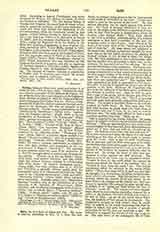

Cain, the first-born of Adam and Eve. His name is derived‚Äû according to Gen., iv, 1, from the root kanah, to possess, being given to him in consequence of the words of his mother at his birth: “I have possessed a man by the favor of the Lord”. No very serious objection can be urged against this derivation. The Book of Genesis, interested in this section in the origin of the different occupations of men, tells us that Cain became a husbandman while his brother Abel tended flocks. They both offered to the Lord a sacrifice, acknowledging, in a manner analogous to that later prescribed in the law, the sovereign power of the Creator. Cain offered of the fruits of the earth; Abel of the “firstlings of his flock and of their fat”. By some means not indicated in the sacred text, perhaps, as has been thought, by some such sign as the fire which consumed the offering of Gedeon (Judges, vi, 21) or that of Elias (III Kings, xviii, 38), God manifested to the brothers that Abel and his sacrifice were acceptable to Him; that, on the contrary, He rejected Cain and his offering. We are not told the reason of this preference. Among the conjectures on the subject one that has found most favor among commentators is that which is incorporated in the Septuagint version of the words of God to Cain in verse vii: “If thou didst offer well but divide badly, hast thou not committed sin?” This implies that Cain committed the fault of presenting to God imperfect gifts, reserving to himself the better part of the produce of the land. However, St. Augustine, who was under the influence of the Septuagint, understood the division in another way. Cain, he tells us, gave God a part of his goods, but he did not give Him his heart (De Civitate Dei, XV, vii). This is in keeping with the cause more generally assigned for God‘s preference. The sequel of the story shows us the evil disposition of Cain’s heart. St. John says that Cain slew Abel because his works were evil, while those of his brother were just (I John, iii, 12), and we read in Hebrews that “by faith Abel offered to God a more excellent sacrifice than Cain” (Heb., xi, 4).
Cain is angered by the Divine rejection. In verses 6 and 7 of chapter iv of Gen. we have God‘s rebuke and warning: “Why art thou wroth, and why is thy countenance fallen? If thou dost well, is not thy countenance raised up? If thou dost not well, sin crouches at the door. Its desire is toward thee, but thou rule over it.” Sin is here represented under the figure of a wild beast crouching at the door of the heart ready to pounce upon its victim. Cain is able to resist temptation. But he does not, and the Bible story goes on to relate the terrible crime born of his anger and jealousy. He slays Abel. Questioned by the Lord as to the whereabouts of his brother, he answers defiantly that he knows not. To avenge the blood of Abel God pronounces a curse against the first homicide. The Hebrew text of the curse may be translated either: “Cursed be thou by the earth which has opened its mouth and drunk the blood of thy brother” etc., or “Cursed be thou from the earth” etc. The former translation refers the sentence to the words which follow: “When thou shalt till it, it shall not give thee its strength” i.e. its produce; the latter, to the banishment related afterwards. This banishment from the country where his parents lived and where, as we learn from such passages as the present one, God continued to manifest His presence in some special way, is spoken of as “going out from before the face of Jehovah” (verse 16). The country of Cain’s banishment, where he was to lead a wandering, vagrant life, is called, in the Hebrew, the land of Nod, and is said to be east of Eden. As we do not know where Eden was, the location of Nod cannot be determined. The punishment seemed to Cain greater than he could bear; in answer to his words expressing fear that he might be killed, God gave him a promise of special protection for his life, and put upon him a sign. No indication as regards the nature of this sign is given us. The only event of the subsequent life of Cain spoken of in the Bible is the founding of a city, called Henoch after a son of that name. A good many authors find that this tradition, which makes of Cain the first city builder, is not compatible with the story just related, which they say is best understood as a popular account of the origin of the wandering desert tribes. If we do not put into the history of the author of Genesis elements of which he seems to have been altogether unconscious, there is no reason to suppose he was wrong in regarding the words of the curse as consistent with the “building” of a city by Cain. Conservative commentators are probably right in their judgment that this “city” of Cain was not of notable extent or importance.
W. S. REILLY

